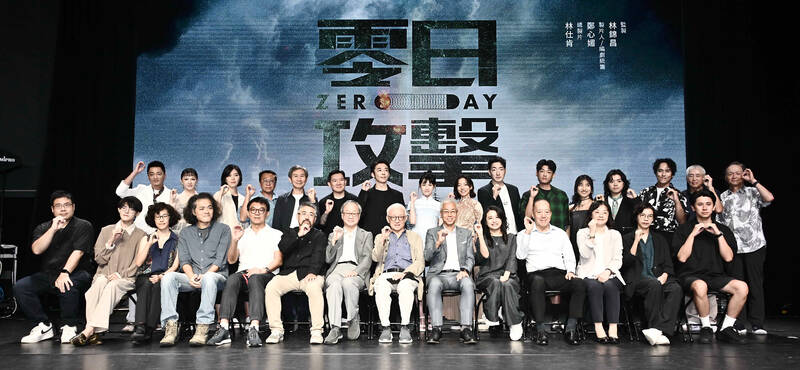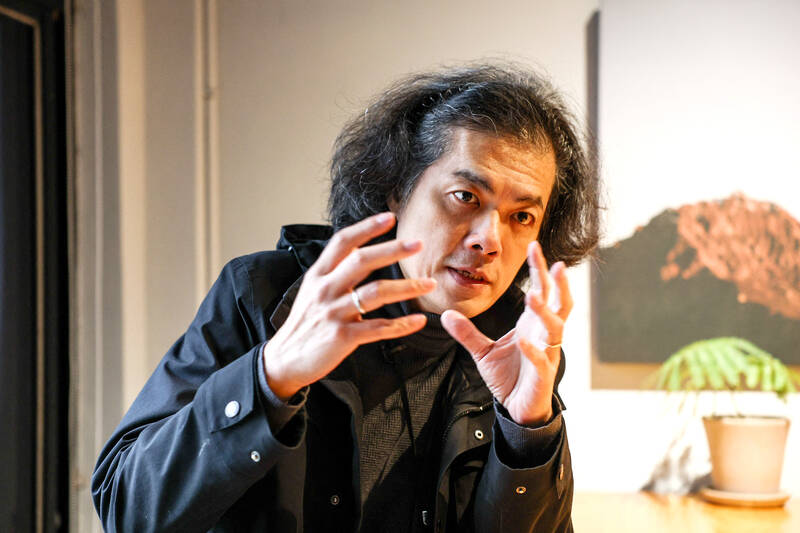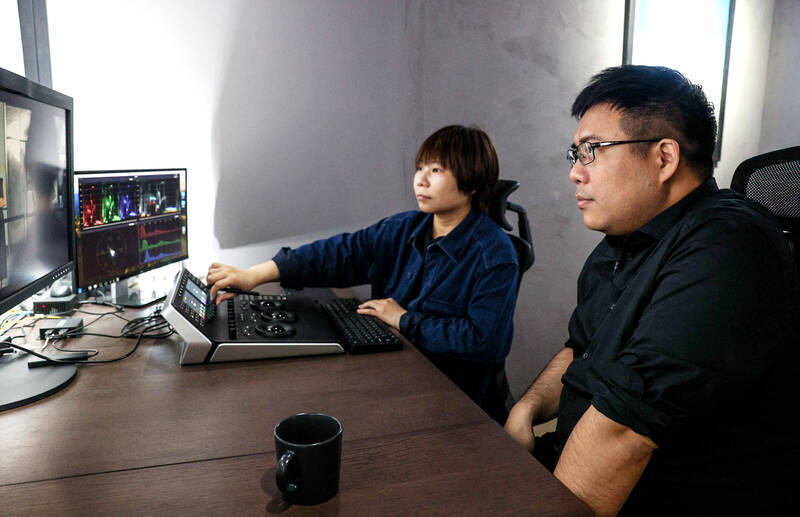A Chinese military blockade of Taiwan ignites panic across the self-ruled island as banks shut down, families flee, fake news spreads and Taiwanese troops brace for attack.
The on-screen chaos is the basis of a new Taiwanese television series called Zero Day (零日攻擊), which creators hope will “awaken” people to the real-life threat of a Chinese invasion of Taiwan.
Beijing has long vowed to annex Taiwan, by force if necessary. But rather than dramatize the cross-strait tensions, Taiwan’s film and television industry has shied away from the topic for fear of losing access to the world’s biggest Chinese language market.

Photo: Chen Yi-chuan, Taipei Times
Lo Ging-zim (羅景壬), one of 10 directors involved in Zero Day, said the war in Ukraine, resurgence of the China-friendly Chinese Nationalist Party (KMT) in Taiwan and China’s growing efforts to influence the nation meant it could no longer be ignored.
“Media around the world were talking about the next battlefield could be the Taiwan Strait,” Lo told said, recalling 2022 when the idea for Zero Day emerged. “It started from a group of people all worried and anxious about the same thing, deciding to gather and take action.”
Zero Day, which refers to the first day Chinese troops land in Taiwan, features 10 standalone episodes and is expected to premiere this year.

Photo courtesy of Zero Day
The trailer shows chaos erupting across Taiwan as Chinese forces surround the island on the pretext of searching for crew members of a military plane that disappeared over nearby waters.
Chinese disinformation floods Taiwan’s Internet, cash machines stop working, stock markets crash and families dragging suitcases seek to escape. The actor playing Taiwan’s president urges people “to unite” in a televised address, warning “without freedom, Taiwan is not Taiwan.”
‘LOOMING THREAT OF WAR’

Photo: AFP
Real-world analysts have warned a Chinese blockade of Taiwan could precede an invasion, and China’s military has practiced cutting off the island during drills.
Taiwan would be outgunned in any conflict with China and would need the United States and other countries to come to its defense.
Zero Day producer Cheng Hsin-mei (鄭心媚), who wrote one of the episodes of the series, said she wanted to “awaken Taiwanese people to the looming threat of war.”

Photo: AFP
She also hoped to inform the international community that Taiwan was not part of China.
“We must tell the world we are not the same political system — we are a free and democratic place and we elect our own president,” Cheng said.
“So when the regime launches an independent act of aggression, it is not a civil war, it is an invasion.”
The Zero Day cast includes actors from Hong Kong, Japan and Taiwan. Cheng said 70 percent of those approached for the series declined to take part, worried they would be blocked from productions hoping to enter China.
Taiwanese actor Kaiser Chuang (莊凱勛) plays a businessman in financial difficulty who unwittingly receives help from Chinese collaborators.
Chuang believes his involvement in Zero Day has already cost him one role, but he firmly insists the series “needed to be made.”
“A life of peace, security and freedom doesn’t come through fear and submission,” said Chuang, describing Zero Day as a “wake-up call.”
“It only comes from constant vigilance, making ourselves stronger, identity with our country and land and unity among people living here.”
‘NOT POLITICAL PROPAGANDA’
To make Zero Day more realistic, creators consulted military and political experts and shot key scenes on site, including a Taiwanese naval vessel and the Presidential Office in Taipei.
Lawmaker Lin Chien-chi (林倩綺) from the pro-Beijing KMT criticized the series for creating “an atmosphere of panic” and blurring “reality and fiction excessively.”
“It inevitably leads to speculation about whether the filming perspective and thinking behind this series are related to the ruling party’s political agenda,” Lin said, referring to the Democratic Progressive Party (DPP). While the production received NT$230 million (US$7.6 million) in funding from the government and private sector, director Lo insisted it was not propaganda.
“We are not making a political propaganda film, nor is it some kind of informational or civil defense educational video — it’s none of those,” Lo said.
“It is a drama. It should attract the audience through human nature, human emotions and human vulnerability.”
Cheng, the producer, said there had been strong international interest in the series and the team was now in talks with several online streaming platforms and television networks around the world.
“It’s also a way to prove that even without access to the Chinese market, Taiwanese drama can still break into other regions,” she said.

As Taiwan’s second most populous city, Taichung looms large in the electoral map. Taiwanese political commentators describe it — along with neighboring Changhua County — as Taiwan’s “swing states” (搖擺州), which is a curious direct borrowing from American election terminology. In the early post-Martial Law era, Taichung was referred to as a “desert of democracy” because while the Democratic Progressive Party (DPP) was winning elections in the north and south, Taichung remained staunchly loyal to the Chinese Nationalist Party (KMT). That changed over time, but in both Changhua and Taichung, the DPP still suffers from a “one-term curse,” with the

Jan. 26 to Feb. 1 Nearly 90 years after it was last recorded, the Basay language was taught in a classroom for the first time in September last year. Over the following three months, students learned its sounds along with the customs and folktales of the Ketagalan people, who once spoke it across northern Taiwan. Although each Ketagalan settlement had its own language, Basay functioned as a common trade language. By the late 19th century, it had largely fallen out of daily use as speakers shifted to Hoklo (commonly known as Taiwanese), surviving only in fragments remembered by the elderly. In

William Liu (劉家君) moved to Kaohsiung from Nantou to live with his boyfriend Reg Hong (洪嘉佑). “In Nantou, people do not support gay rights at all and never even talk about it. Living here made me optimistic and made me realize how much I can express myself,” Liu tells the Taipei Times. Hong and his friend Cony Hsieh (謝昀希) are both active in several LGBT groups and organizations in Kaohsiung. They were among the people behind the city’s 16th Pride event in November last year, which gathered over 35,000 people. Along with others, they clearly see Kaohsiung as the nexus of LGBT rights.

In the American west, “it is said, water flows upwards towards money,” wrote Marc Reisner in one of the most compelling books on public policy ever written, Cadillac Desert. As Americans failed to overcome the West’s water scarcity with hard work and private capital, the Federal government came to the rescue. As Reisner describes: “the American West quietly became the first and most durable example of the modern welfare state.” In Taiwan, the money toward which water flows upwards is the high tech industry, particularly the chip powerhouse Taiwan Semiconductor Manufacturing Co (TSMC, 台積電). Typically articles on TSMC’s water demand